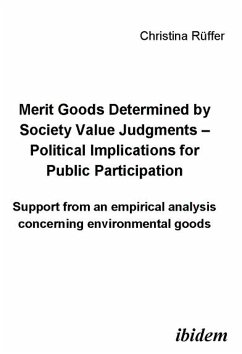When behavioral results repeatedly fail to be explained by the assumption that people act as homines economici, these stable response patterns have to be analyzed by a different approach. The concept of merit goods offers one explanation.In this book prevailing misconceptions about merit goods are unveiled and the legitimation and political relevance of the merit good argument when based on society value judgments are demonstrated. Society value judgment in this context means that citizens prefer to decide according to society's best interest rather than in their personal interest. Governmental intervention interfering with individual preferences, however, is often considered as interfering with consumer sovereignty. In this book, "participation" is proposed as the missing link between the merit good concept and its compatibility with consumer sovereignty. The book also considers what reasonable participation could look like.Thus, being a 'merit good' is not a characteristic, but must rather be seen as the estimation of the people determined by history, values, culture, current situation, knowledge, etc. and must therefore be analyzed as this. In this book, merit goods will be determined and useful participation pointed out using ecological goods from a case study of a result-oriented agri-environmental program as example.
Dieser Download kann aus rechtlichen Gründen nur mit Rechnungsadresse in A, B, BG, CY, CZ, D, DK, EW, E, FIN, F, GR, HR, H, IRL, I, LT, L, LR, M, NL, PL, P, R, S, SLO, SK ausgeliefert werden.









